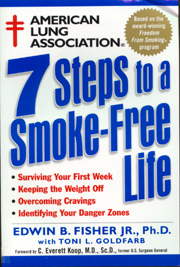Cigarette smoking is the number one cause of preventable death in the United States. According to the U.S. Surgeon General, "More than 430,000 deaths in the United States each year are attributable to tobacco, making tobacco the Number One cause of death and disease in the United States." The World Health Organization says that Tobacco is a "Death Warrant" for its users. Unfortunately, more than 3,000 children and adolescents start smoking each day. Cigarette smoking has been shown to cause or contribute to all the following diseases:
- Lung Cancer.
- Mouth, Throat, and Vocal Cord Cancer.
- Pancreatic Cancer.
- Bladder Cancer.
- Cancer of the Stomach, Liver, Cervix, Uterus, and Kidney.
- Cancer of the Nasal Sinuses.
- Heart Attack.
- Stroke.
- Emphysema.
- Chronic Bronchitis.
- Triggering of Asthma attacks.
- High Blood Pressure.
- Poor Wound Healing (eg after surgery).
- Poor Circulation, which can lead to death of the toes, then feet and legs, and the need for Amputations.
- Weakened Immune System, leading to frequent infections.
- Ulcers of the Stomach and Small Intestine.
- Chronic Sinusitis.
- Infertility.
- Low Birth Weight Babies.
- Impotence or Erectile Dysfunction (Fully 60% of smokers eventually become impotent. Sometimes Viagra helps, sometimes it doesn't.)
- Incontinence in Women (Leakage of urine upon coughing, laughing, or straining.)
- Early Menopause.
- Osteoporosis (weak bones).
- Accelerated wrinkles in the skin.
- Macular Degeneration (Causing Blindness in older people who smoked for many years.)
- Leukemia.
Some of these diseases, like lung cancer, occur only in some smokers. Others, like elevated blood pressure and a weakened immune system, occur in all smokers. The U.S. Surgeon General has a new 2004 Interactive Multimedia Presentation showing how smoking affects nearly all the organs in the human body.
Smoking also affects the people around the smoker. Nonsmokers who are exposed to secondhand smoke from nearby smokers also suffer from the above illnesses. Heart attacks recently went down by 60% after passage of a smoking ban in Montana. Parents who smoke model smoking behavior for their children, and those children receive the message that smoking is okay for them too.
Addiction: Given all the dangers caused by smoking, it is important that all smokers quit smoking as soon as they are able. Quitting is difficult because of both the physical and the psychological addictions. Nicotine is considered by many to be more addictive than heroin. Nicotine patches help with the withdrawal from nicotine, but tobacco companies add 300 other chemicals to cigarettes in addition to nicotine, and the patch only contains nicotine.
Behavior: Additionally, any familiar habit is hard to break. Smoking is a habit, a behavior, and even a ritual for some smokers. It is important that persons trying to quit smoking find other activities, behaviors, and rituals, to replace smoking. They must do their new activities, behaviors, and rituals, during the times when they used to smoke cigarettes (eg during breaks at work, after dinner, etc.) Otherwise, they will be thinking about nothing but smoking at those times, and it is important to get one's mind off of smoking as much as possible when trying to quit.
Medicine: Most people are familiar with Nicotine Patches, which allow smokers to gradually decrease the level of Nicotine in the body, for a smoother withdrawl. In addition to the patch, there is a non-addictive medicine called Bupropion, which helps many people quit smoking. You may have seen it advertised under the brand name Zyban. Bupropion initially came out as an antidepressant, with the brand name Wellbutrin. It was then discovered that smokers who were taking Wellbutrin for depression tended to quit smoking. The manufacturer then re-released Bupropion, with the new brand name Zyban, as a stop-smoking aid. It is safe to use Bupropion together with a Nicotine patch. The combination is more effective than either one alone. Bupropion is available by prescription only; Nicotine patches are available over-the-counter, without a prescription. In addition to the Patch, there are many other nicotine products and other medicines that can help.
Support: Some smokers are able to make the above mentioned behavioral changes on their own, and others need help. It is okay to need help and to ask for help. There is a support group, called Nicotine Anonymous, which holds meetings in Glenside, Doylestown, Philadelphia, and other locations. You can contact them for information about group meetings, which are free, by going to their web site, http://www.nicotine-anonymous.org, or calling 415-750-0328. There is also a web based support program, called QuitNet, that offers free and professional stop-smoking support. Also, local professional counseling is available, and is very helpful for those who are willing to try it.
Reading: Some people prefer to read a book to learn how to successfully quit smoking. For those people, I recommend the American Lung Association's Seven Steps to a Smoke-Free Life. You can get the book from Hazelden Bookstore (1-800-328-9000), from Amazon.com (see below), or from a local bookstore. A picture and a description from Hazelden are included below.

7 Steps to a Smoke-Free Life
Author: Edwin Fisher
Author: Toni L. Goldfarb
|
|
Softcover, 240 pp.
ISBN: 0-471-24700-6
Price: $12.95
The American Lung Association's award-winning Freedom from Smoking program has helped hundreds of thousands of smokers quit. Now it can help you.
Without lectures, without gimmicks--and without compromise--this straightforward, sympathetic book carefully guides you though the seven steps that will lead to a longer, healthier life. You'll begin by going directly to the source of your addiction: Identifying what triggers your own smoking habit. Armed with that knowledge, you'll prepare for quitting day and finally, firmly set yourself on the road to a life free of cigarettes forever.
With great Quick Quit Tips throughout, 7 Step to a Smoke-Free Life provides the guidance and support you need to cope with cravings, manage stress, keep off extra weight, avoid setbacks, and, above all, stick with it. Let the nation's leading authorities help you kick the habit comfortably, safely, and permanently.